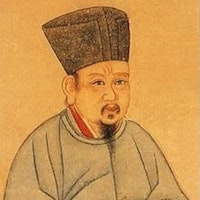Heaven is my father and Earth is my mother, and even such a small being as I finds an intimate place in their midst.
Heaven is my father and Earth is my mother, and even such a small being as I finds an intimate place in their midst.
Zhang Zai

The Western Inscription
Topic: Virtue, Morality, & Ethics
Heaven is my father and Earth is my mother, and even such a small being as I finds an intimate place in their midst. Therefore that which fills the universe I regard as my body and that which directs the universe I consider as my nature. All people are my brothers and sisters and all things are my companions.
Zhang Zai (Chang Tsai, 1020—1077)
Zhang Zai was born in 1020 and died in 1077. He was an important scholar during the Song dynasty in China and played a key role in developing Neo-Confucianism, specifically a branch known as the "Study of the Way." Coming from a family of scholars, he held various official positions throughout his life, putting his philosophical ideas into practical use within the government.
One of his major contributions to philosophy was a brief essay called the Western Inscription. The essay was named this way because it was written on the west wall of his study. In it, he expressed the idea that Heaven and Earth are like a father and mother to all beings, emphasizing the natural relationship between humans and the universe. He saw every person as his sibling and every thing as his companion, speaking to the core belief of interconnectedness in Neo-Confucian thought.
Through the Western Inscription, Zhang Zai laid the ethical groundwork for Neo-Confucianism. His words became a point of reference for later scholars and continue to be studied today. The core message is simple: we are all connected to each other and to the universe, a notion that has practical implications for how we live and govern.
The Western Inscription
Wing-tsit Chan, A Source Book in Chinese Philosophy, Princeton: Princeton University Press, 1963 p. 497 [Zhang Zai, The Western Inscription].

Zhang Zai

Wing-tzit Chan About The Western Inscription [Commentary]
Human Nature and Ethics (excerpt)
Heavenly Society (신사회) and the Development of Hyojeong (孝情) Culture (Excerpts)
Resources
Related Quotes
Copyright © 2017 – 2026 LuminaryQuotes.com About Us